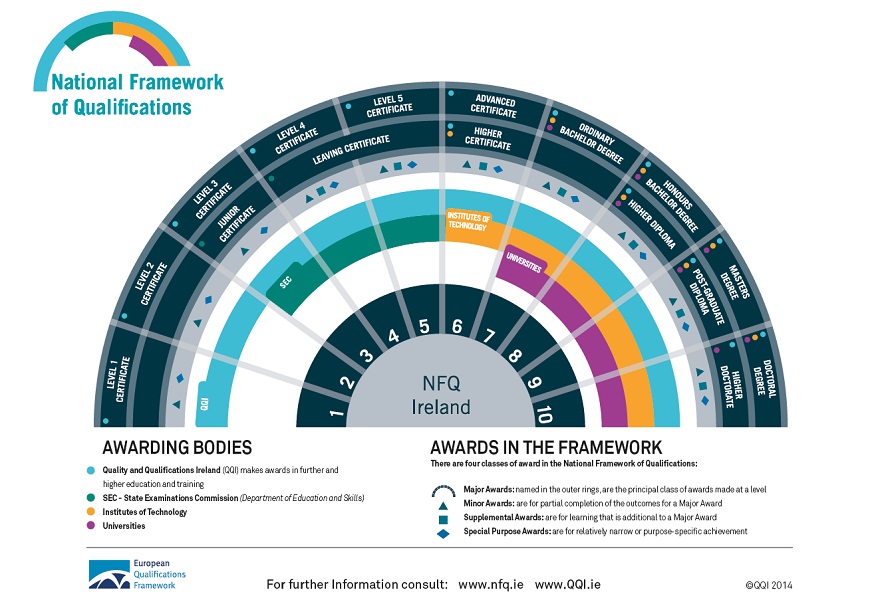Accreditation Quality and Qualifications Ireland (QQI) Established
QQI awards are designed to provide access to employment, further/higher education and training. QQI is responsible for developing a system of qualifications for the further education and training sector. This system is part of the overall development of the new 10-level National Framework of Qualifications which will, in time, include all awards available in the State. Within the National Framework QQI Awards are placed at levels 1-6 on the National Framework of Qualifications and HETAC (Higher Education & Training Awards Council). Awards are placed at levels 6-10. This includes the former awards of FÁS, Fáilte Ireland (formerly CERT/NTCB), National Council for Vocational Awards (NCVA), Teagasc and the Foundation Certificate previously awarded by the former National Council for Educational Awards (NCEA). If you would like to find out more about the content of the FETAC modules visit www.nfq.ie and www.qqi.ie
 Qualification Recognition – Ireland
Qualification Recognition – Ireland
FETAC makes awards at levels 1-6 of the National Framework of Qualifications (NFQ)
| Level | Award Description |
| Level 1 | Signifies achievement of elementary learning, within a well- supported familiar environment. |
| Level 2 | Indicates achievement of basic learning; award holders are generally able to carry out familiar routine tasks in well supported environments. |
| Level 3 | Indicates basic learning across a range of areas, including managing routine text or numerical information of a familiar nature. Award holders have demonstrated ability to follow straightforward directions and to take on new tasks. |
| Level 4 | Are typically associated with introductory level employment. Award holders have demonstrated ability to act responsibly and independently and can solve familiar problems well, independently and as part of a group |
| Level 5 | Holders have a broad range of knowledge, skill and competence and take responsibility for the nature and quality of work in a managed environment. A level 5 award signifies capacity to act independently and responsibly in a wide range of contexts. |
| Level 6 | Signifies a high level of skill and fluency; complex problems can be solved taking account of specialised knowledge across a broad area of expertise. Level 6 awards are associated with supervisory work where responsibility for the quality of others work is accepted. |
Would you like to know more about having your foreign qualifications recognised in Ireland. Visit www.qualificationsrecognition.ie for further information. www.fess.ie
Examples of External Accreditation Bodies
| www.qqi.ie www.nfq.ie | Further Education Training and Awards Council / Higher Education Training and Awards Council |
| www.ecdl.co.uk | European Computer Driving Licence |
| www.cityandguilds.com | City & Guilds |
| www.itecworld.co.uk | International Therapy Examination Council (e.g. Hairdressing/Beauty) |
| www.cidesco.com | Beauty Therapy Awarding Council |
| www.cibtac.com | Beauty Therapy Awarding Council |
| www.iati.ie | Institute of Account Technicians in Ireland |
| www.iacp.ie | Irish Association of Counselling and Psychotherapy |
| www.pitman-training.ie | Pitman Training |
European Qualifications Framework
This site allows you to compare national qualifications systems or frameworks of countries that have already related their national qualifications levels to the EQF. To compare how one country references its national qualification levels to the EQF with another, select a flag of the country of your choice to start the process
http://ec.europa.eu/eqf/compare_en.htm
Worldwide Qualifications Framework visit www.enic-naric.net. Foreign qualification database visit Foreign Qualifications database
An ENIC is a body set up by the national authorities. While the size and specific competence of ENIC may vary, they will generally provide information on:
– the recognition of foreign diplomas, degrees and other qualifications; – education systems in both foreign countries and the ENIC’s own country; – opportunities for studying abroad, including information on loans and scholarships, as well as advice on practical questions related to mobility and equivalence.


